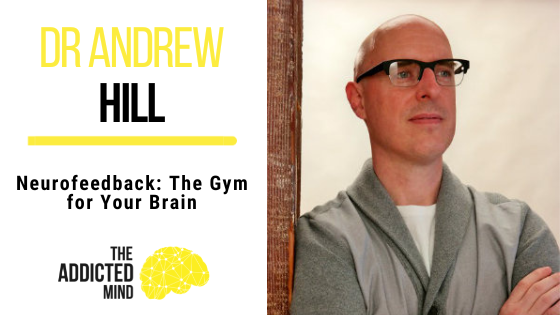Can you train your brain to improve your sleep, better your health, and possibly abolish your tolerance for alcohol, drugs, or other things you might be struggling with?
According to today’s guest, Dr. Andrew Hill, peak performance coach and the founding director of Peak Brain Institute, one of the most insidious things about brain and mind-stuff is that we feel like things are not going to change, and that is just not true. The brain shift happens – it’s not a question of if, but how.
Peak Brain Institute is a gym for your brain. It is a brain optimization company across life stages for some people. Neuroscientists help people take control of their own neuroscience the same way your favorite personal trainer at your gym helps you learn how to move through transformation goals.
Also known as brain training, most forms of neurofeedback are a passive form of operant conditioning, but in an involuntary form. It’s essentially taking something you’re not usually aware of. For instance, they’re raising information from the brain waves or blood flow up to a level where the brain can interact with it. Dr. Hill emphasizes the use of the brain, not the mind. Hence, it’s different from the classic biofeedback techniques such as the use of relaxation therapy.
Neurofeedback is an option for you to help with your brain, and studies show its positive impact on people dealing with issues pertaining to anxiety, stress, alcohol use, and drug use. On this episode, Dr. Hill talks about what’s going on and what’s happening in the brain as this process is unfolding so you can gain a better understanding of your brain, what makes up who you are, and how you can change or improve that.
In this episode, you will hear:
- Biofeedback versus neurofeedback
- How your brain is trained to achieve your goals
- How brain mapping works
- The differences in results with eyes closed versus eyes opened
- The impact of brain training on physical fitness
- How neurofeedback impacts people with alcohol and substance issues
Key Quotes:
[04:46] “Neurofeedback is biofeedback, or a form of control, shaping, or exercise of stuff in your brain.”
[04:55] – “All neurofeedback is a form of biofeedback, but not all forms of biofeedback are done in the brain.”
[07:53] – “It’s mostly involuntary because you can’t feel your beta waves or your theta waves. But after about three or four sessions, you get this lingering effect that tends to show up for a couple of hours to about a day. It tends to impact the resources you have trained like your sleep, stress, and attention, and you get noticeable changes.”
[10:00] – “Your brain is mostly an electrical and mechanical machine… and the resources of your brain are roughly the same.”
[11:35] – “There are some things that emerge in the EEG that are almost diagnostic, or that are at least useful.”
[21:41] – “Other brains with similar complaints and similar goals don’t respond the same way when you start doing neurofeedback. And so, you have to be very aware of the actual person’s experience.”
[32:08] – “If you do a few weeks of neurofeedback, you abolish the tolerance for cannabis.”
[39:21] “One of the most insidious things about brain and mind-stuff is that we feel like things are not going to change, and that is just not true. The brain shift happens… It’s not a question of if, it’s how.”
Subscribe and Review
Have you subscribed to our podcast? We’d love for you to subscribe if you haven’t yet.
We’d love it even more if you could drop a review or 5-star rating over on Apple Podcasts. Simply select “Ratings and Reviews” and “Write a Review” then a quick line with your favorite part of the episode. It only takes a second and it helps spread the word about the podcast.
If you really enjoyed this episode, we’ve created a PDF that has all of the key information for you from the episode. Just fill in your information below to download it.
Supporting Resources:
Peak Brain Institute

